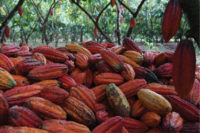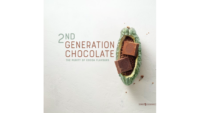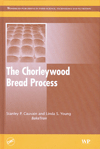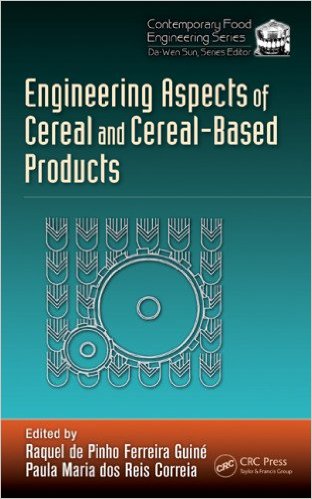Colombia is synonymous with coffee. So much so, that to those of us who live in the United States, Juan Valdez is a household name. That the clean, white-clad coffee farmer and his mule are fictitious is of little consequence. And though many in the northern Americas still think otherwise, coffee did not actually originate in Colombia – even if that highly successful advertising campaign led us to believe it did.
A decade ago, we spent a considerable amount of time in Colombia learning everything we could about coffee. Last year, we returned for a different reason – to learn about Colombian cacao. What we saw and the people we met, were every bit as exciting.
Our first big introduction to Colombian chocolate happened when we stopped to visit the CasaLuker booth in Chicago at the National Chocolate and Dessert Show in the fall of 2013. The Bogota-based company is family-owned and has been making chocolate, primarily for the Colombian domestic market, since 1906.
At the Salon du Chocolat in Paris, Luker’s Brand Manager Mariana Arensburg Uribe showed us a map of the country’s major growing regions. What excited us was the glimpse she gave us of a country that is taking its place as a major producer of fine flavor cacao — an initiative motivated through a combination of progressive companies, governmental policy and mission-driven, non-governmental organizations working to facilitate market growth.
We were curious. So Luker invited us to come see firsthand.
GRANJA LUKER
Traveling to Granja Luker, the company’s model cacao plantation and learning center located near Manizales in the heart of the Colombian Coffee Cordierra, we saw a facility that serves many purposes with great results.
First, as a research center, it focuses on every aspect of the cultivation of cacao, from an in-depth examination of cultivars, to optimal fermentation and harvesting processes.
As a learning center it provides cacao farmers with a place for exchange and study into all aspects involved in growing fine quality cacao. For buyers, chocolatiers and assorted members of the press, it smartly provides Luker with a showcase for its products, history, stories and people.
Established in 1962, the farm educates approximately 700 people annually; more than 30,000 since its inception. At the same time, it exemplifies Luker’s commitment to those people the company ultimately depends on – its farmers. By working hard to maximize the income of farmers through higher yields, it also focuses on promoting high quality production practices and environmental sustainability. Obviously, that can be a careful balancing act. When done successfully, it changes lives.
Our first morning there started with a “farmer’s” breakfast with the workers – including a traditional cup of hot, frothy chocolate. Wandering the well-kept farm the next two days, we observed an ongoing array of processes – from the daily routines of harvesting, fermenting and drying – to grafting, seed preparation and a delicate demonstration of pollination by hand. All of the Granja Luker workers have his or her area of expertise, but as they move around the farm, they are adept at any task.
Seeds we watched being prepared for planting are not only used on the farm but sold at small cost to regional farmers, as are the grafting stems and young trees. That speaks to Luker’s commitment “to continuously develop and improve Colombia’s cacao farming culture.”
“Cacao is a peace and development crop,” Granja Luker Manager Mauricio Salazar tells us. “This is our biggest achievement.” What he is telling us is even more evident that evening. Over dinner with a group of 20 farmers at the end of their stay, we sit amongst men and women who will take all they’ve learned back to their farms. It is obvious from the laughter and camaraderie amongst them that they’ve spent the week accomplishing more than learning process and technique. Simultaneously, they have developed friendships and the support of an ongoing network of peers — another integral component to take home to the relative isolation of daily farm life.
NECOCLI
During our time at Granja Luker we kept hearing about the model farm that Luker had launched on the Atlantic coast, a startup cacao plantation in a region where it had not previously grown. The project intrigued us.
Traveling there on our second trip to Colombia we saw a very different kind of Luker undertaking. Partnering with landowners near the small town of Necocli just north of the Panamanian isthmus, this young project is now in its 5th year. The long-range goal is to establish a sustainable monetary livelihood for a community that lacked one through a carefully laid out introduction of cash crops and land development. Luker’s role is to provide technical and management skill, as well as to introduce social improvements through its component arm, the Luker Foundation.
The steeply pitched, 550-hectare farm — called El Rosario — sits 150 meters above sea level. Until recently it was land previously cleared for cattle, which had depleted the soil, caused erosion and allowed it to be taken over by unwanted vegetation. Jesus Estrada, the project’s Chief Operating Officer, explained that before anything was planted, a great deal of research and study focused on soil and climatic conditions as well as the strengths and weaknesses of various trinitario varietals.
Today the entire acreage has been planted, following a 3-part layout: First to be introduced around the periphery of each section were melina trees — a fast-growing, tropical hardwood indigenous to Asia. Widely used in Costa Rica, melina is known for its usefulness in industrial reforestation and development.
Secondly, plantain trees were added, both because of their ability to provide an early source of income, but also to provide shade for the young cacao trees interspersed alongside them.
The approach was designed — not only to allow the farm to benefit from a staggered income from three viable sources — but for other reasons, which have already begun to take effect. In older sections that were planted first, the melina trees already provide high shade. Some are even being harvested to build fermentation boxes needed now that the oldest cacao trees have begun to bear fruit.
Meanwhile, another benefit is happening at ground level. Both leaf drop and shade from the hardwoods has begun to nourish the soil and eliminate the unwanted high grass growing there. “These are noble weeds,” Estrada tells us with a smile looking at the low-growing weeds that have begun to replace the grasses. To him, that means fewer labor hours to maintain the forest floor.
Later in the day, standing atop a lookout where we can see the project’s entire expanse, we ask him if the farm has begun to turn a profit. Not yet, Estrada tells us, but he feels hopeful that will happen soon. And, with the cacao trees just beginning to bear fruit, there is every reason to believe in the promise of success. Already Necocli has been the model for another landowner to start a similar project nearby.
As impressive as the project is, the most inspiring aspect comes through the complementary work of the Luker Foundation, headed in Necocli by social psychologist, Andrea Armel. She is also Jesus Estrada’s wife; drawing on the strength of very different professional backgrounds, they have worked hand-in-hand on this endeavor from the beginning.
The Foundation’s focus is to support schools being built by the landowners by furnishing them with books, blackboards, chairs, paper, pencils — all the many items, people and resources it takes to make a school functional. It is also focusing on meal and snack programs so that the children not only learn about a healthy diet, but actually eat one.
Armel tells us she has noticed a huge change in the personalities of the children since she’s been there. “They used to stand back and watch without any reaction,” she tells us. “Now, they are excited to see us, they wave, they hug us, they jump up and down. They dream of a future.”
During the Christmas holidays, CasaLuker’s customers and friends, as well as the Necocli children, were given a gift which artfully supported the work of the Foundation. It was a beautifully drawn e-storybook that creatively speaks to both audiences. To the children it affirms a changing way of life, and the positive outcomes that ride on hopes for that change. Embedded in the storybook, is a prescient “thank you” to the Luker company’s network of customers, friends and chocolate lovers that contribute to making that happen.
LINKS:
www.lukeringredients.com/en/granja-luker
www.lukeringredientschristmas.com
https://www.youtube.com/watch?v=biYl7vEWMkw
Next month: Focus on Colombia Part II: Meta Cacao: Brings a New Way of Life after FARC





















